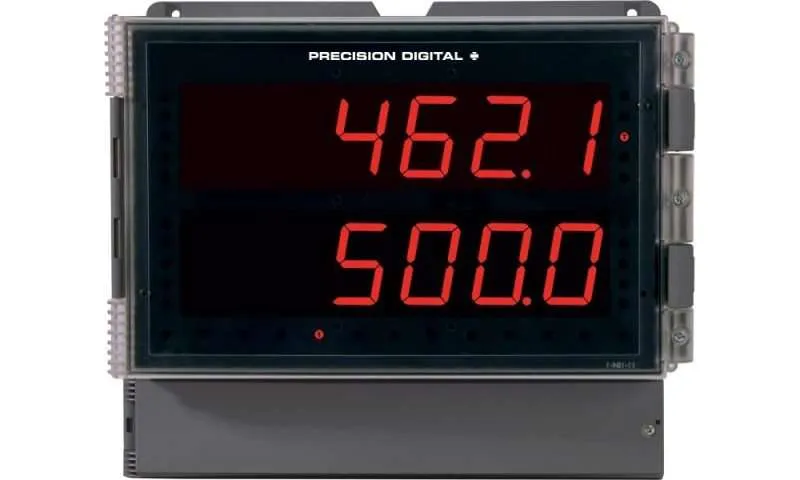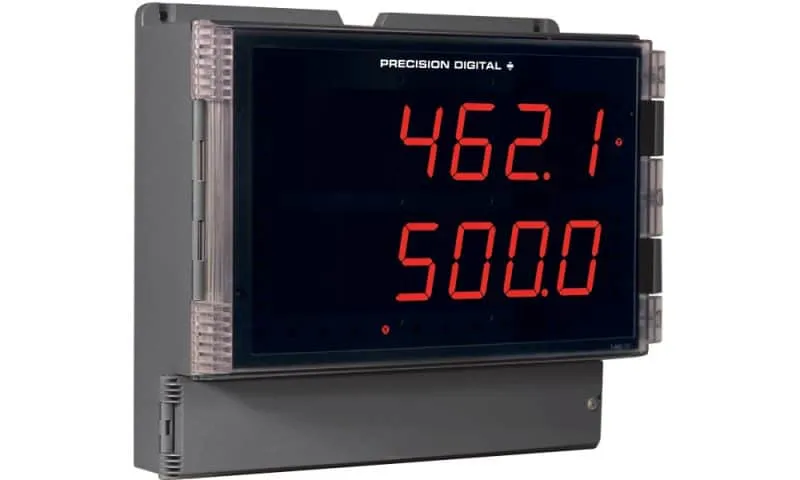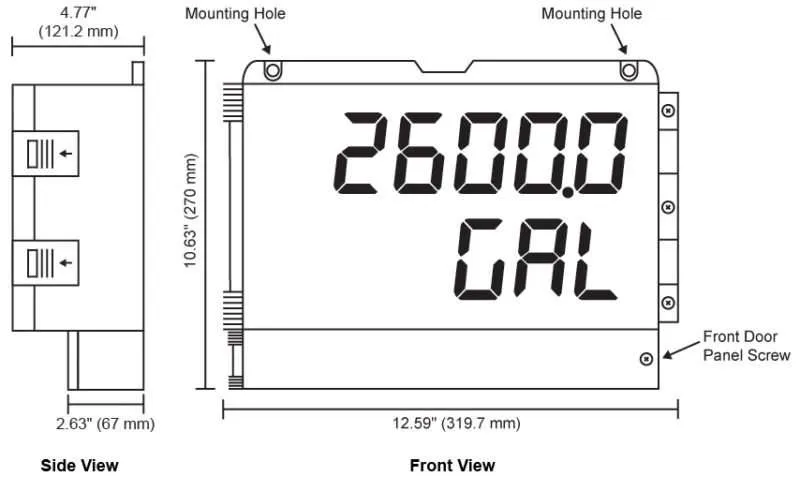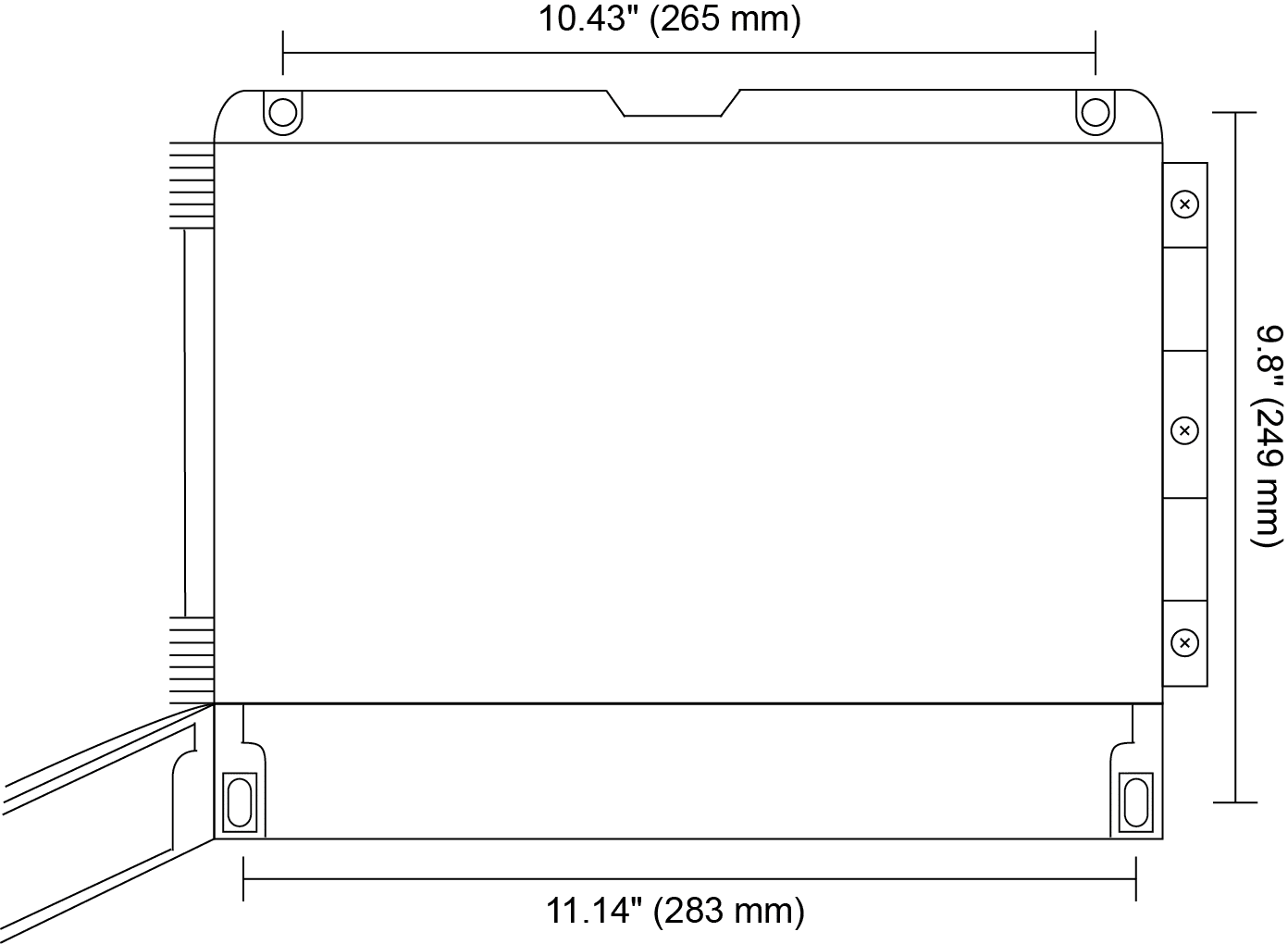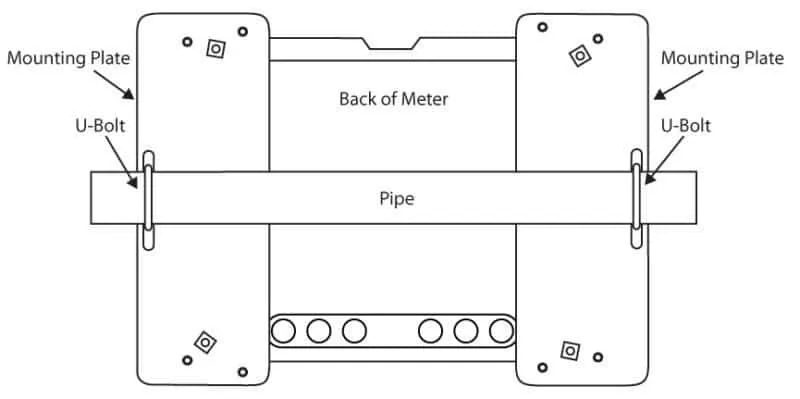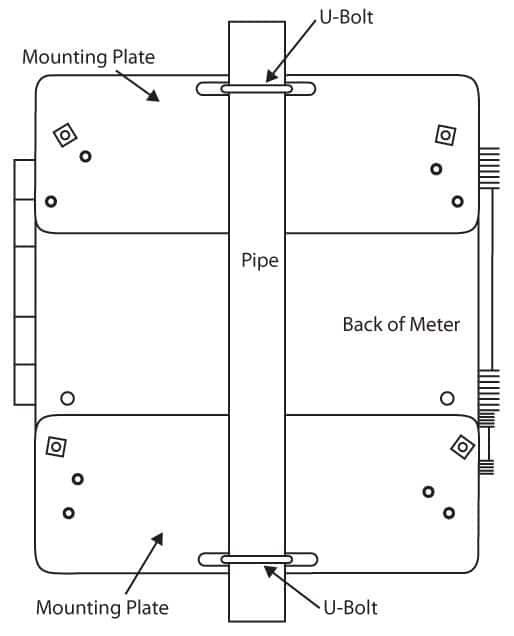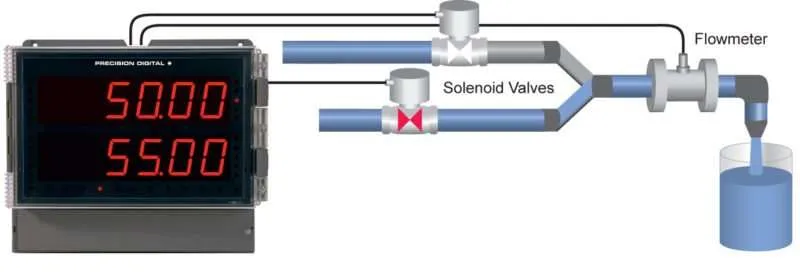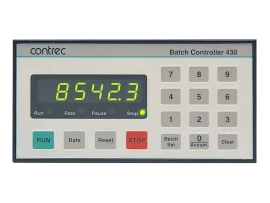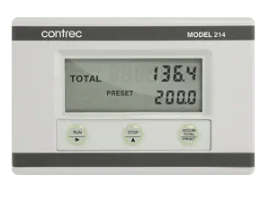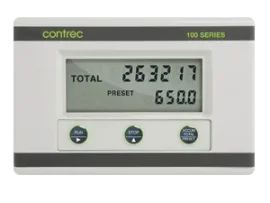- Readable from up to 30 Meters (100 Feet) Away
- Isolated 24 VDC @ 200 mA Transmitter Power Supply
- Large 1.80″ Digits
- Display Batch Total + Rate, Grand Total, Batch Count or Preset
- Single or Multi-Stage Batching with up to 8 Relays
- Automatic Overflow Protection
- Manual Control or Automatic Batching
- Current Input Protected by Resettable Fuse
- On-Board Digital Input (for Remote Reset)
- Count Up or Down, Total & Grand Total
Precision Digital PD2-6210 Helios Analog Input Batch Controller
The Helios PD2-6210 Large Display Meter stands out with its dual line display featuring bright LEDs. These LEDs ensure visibility even in direct sunlight and from distances of up to 100 feet. This meter is part of Precision Digital’s renowned ProVu® series, making it suitable for various applications including level, flow, temperature, pressure, and weight measurements.
Choose the Helios PD2-6210 for effective batch control with a 4-20 mA output flowmeter. Its large display allows operators to easily monitor batching processes from a distance, enhancing convenience and efficiency. Additionally, the PD2-6210 is housed in a NEMA 4X, IP65 rated enclosure, making it perfect for installation in wet, dusty, or dirty environments. This meter is capable of managing both single and multi-stage batching applications.
- Bright dual line display for easy reading
- Visible from up to 100 feet away
- Compatible with various inputs: 4-20 mA, thermocouple, RTD, pulse, strain gauge, AC and DC volts and current, and Modbus®
- NEMA 4X, IP65 rated for durability in harsh conditions
- Ideal for batch control and monitoring
- Supports single and multi-stage batching applications
General
Display: Two lines with 1.8″ (46 mm) high digits, red LEDs; 6 digits per line (-99999 to 999999), with lead zero blanking
Default Display Assignment: The upper display shows batch total. The lower display shows rate with alternating units, and can be switched to show grand total, batch count, or preset with the STOP key.
Custom Display Assignment: The upper and lower displays may be assigned to rate, total, grand total, batch count, preset, set points, units (lower display only), alternating R & T, R & GT, preset & rate, max & min, or a Modbus display register. Any rate/total/grand total display may be programmed to alternate with a custom unit or tag.
Alternating Display: Displays alternate every 10 seconds when display is selected or the batch is paused.
Display Intensity: Eight user selectable intensity levels
Display Update Rate: 5/second (200 ms)
Overrange: Display flashes 999999
Underrange: Display flashes -99999
Operating Methods: Three programmable front panel buttons (default START, BATCH, STOP), digital inputs, PC and MeterView Pro software, and Modbus registers.
Programming Methods: Four SafeTouch through-glass buttons when cover is installed. Four internal pushbuttons when cover is removed.
F4 Digital Input Contacts: 3.3 VDC on contact. Connect normally open contacts across F4 to COM.
F4 Digital Input Logic Levels: Logic High: 3 to 5 VDC; Logic Low: 0 to 1.25 VDC
Noise Filter: Programmable from 2 to 199 (0 will disable filter)
Filter Bypass: Programmable from 0.1 to 99.9% of calibrated span.
Recalibration: Recommended at least every 12 months.
Max/Min Display: Max (Peak) / min (Valley) readings reached by the process are stored until reset by the user or until power is cycled.
Password: Three programmable passwords restrict modification of programmed settings and two prevent resetting the totals.
Non-Volatile Memory: All programmed settings are stored in non-volatile memory for a minimum of ten years if power is lost.
Power Options: 85-265 VAC 50/60 Hz, 90-265 VDC, 20 W max or 12-24 VDC ± 10%, 15 W max. Powered over USB for configuration only. Isolated Transmitter Power Supply: Terminals P+ & P-: 24 VDC ± 10%. 12-24 VDC powered skus selectable for 24, 10, or 5 VDC supply (internal P+/P- switch). 85-265 VAC skus rated @ 200 mA max, 12-24 VDC powered skus rated @ 100 mA max, @ 50 mA max for 5 or 10 VDC supply.Fuse: Required external fuse: UL Recognized, 5 A max, slow blow; up to 6 controllers may share one 5 A fuse.
Normal Rejection Mode: Greater than 60 dB at 50/60 Hz
Isolation: 4 kV input/output-to-power line. 500 V input-to-output or output-to-P+ supply.
Overvoltage Category: Installation Overvoltage Category II: Local level with smaller transient overvoltages than Installation Overvoltage Category III.
Environmental:
T6 Class operating temperature range Ta = -40 to 60°C
T5 Class operating temperature range Ta = -40 to 65°C
Max Power Dissipation: Maximum power dissipation limited to 15.1 W
Connections: Removable screw terminal blocks accept 12 to 22 AWG wire, RJ45 for external relays, digital I/O, and serial communication adapters.
Enclosure: UL Type 4X, IP65 rated. Polycarbonate & glass blended plastic case, color: gray. Includes four PG11 through-hole conduit openings, with two factory installed PG11, IP68, black nylon threaded hole plugs with backing nuts.
Wall Mounting: Four (4) mounting holes provided for mounting meter to wall. Pipe Mounting: Optional pipe mounting kit (PDA6260) allows for pipe mounting. Sold separately.
See PD2-6210 manual for instructions.Dimensions: 10.63″ x 12.59″ x 4.77″ (270 mm x 319.7 mm x 121.2 mm) (H x W x D)
Weight: 6.10 lbs (2.76 kg)
UL File Number: UL & C-UL Listed. E160849; 508 Industrial Control Equipment.
Warranty: 3 years parts & labor
USB Connection: Compatibility: USB 2.0 Standard, Compliant
Connector Type: Micro-B receptacle
Cable: USB A Male to Micro-B Cable
Driver: Windows 98/SE, ME, 2000, Server 2003/2008, XP 32/64-Bit, Vista 32/64-Bit, Windows 7 32/64-Bit, Windows 10 32/64-Bit
Power: USB Port
Analog Input
Inputs: Field selectable: 0-20, 4-20 mA, ±10 VDC (0-5, 1-5, 0-10 V), Modbus PV (Slave)
Accuracy: ±0.03% of calibrated span 1 count, square root & programmable exponent accuracy range: 10-100% of calibrated span
Temperature Drift: 0.005% of calibrated span/°C max from 0 to 65°C ambient, 0.01% of calibrated span/°C max from -40 to 0°C ambient
Signal Input Conditioning: Linear, square root, programmable exponent, or round horizontal tank volume calculation.
Multi-Point Linearization: 2 to 32 points
Programmable Exponent: 1.0001 to 2.9999
Low-Flow Cutoff: 0-999999 (0 disables cutoff function)
Decimal Point: Up to five decimal places or none: d.ddddd, dd.dddd, ddd.ddd, dddd.dd, ddddd.d, or dddddd.
Calibration Range:
| Input Range | Minimum Span Input 1 & 2 |
| 4-20 mA | 0.15 mA |
| 10 V | 0.10 V |
An error message will appear if input 1 and input 2 signals are too close together.
Input Impedance: Voltage ranges: greater than 1 MΩ.
Current ranges: 50 – 100 Ω (depending on resettable fuse impedance).
Input Overload: Current input protected by resettable fuse, 30 VDC max. Fuse resets automatically after fault is removed.
HART Transparency: Analog input will not interfere with existing HART communications on the wired 4-20 mA signal
Batch Controller
Rate Display Indication: 0 to 999999, lead zero blanking. “R” LED illuminates while displaying rate.
Total Displays & Grand Total Overflow: 0 to 999,999; automatic lead zero blanking. “T” LED is illuminated while displaying batch total and “GT” for grand total. Up to 999,999,999 with total-overflow feature. “![]() ” is displayed to the left of grand total overflow and ▲ LED is illuminated.
” is displayed to the left of grand total overflow and ▲ LED is illuminated.
Batch Total Decimal Point: Up to five decimal places or none: d.ddddd, dd.dddd, ddd.ddd, dddd.dd, ddddd.d, or dddddd. Total decimal point is independent of rate decimal point.
Totalizer: Calculates total based on rate and field programmable multiplier to display total in engineering units. Time base must be selected according to the time units in which the rate is displayed.
Total Conversion Factor: 0.00001 to 999,999
Batch Preset: 0.00001 to 999,999 based on batch total decimal point.
Automatic Batch Restart Delay: 00000.1 to 999.9 seconds. The batch will automatically restart after completion of the last batch.
Grand Total Rollover: Totalizer rolls over when display exceeds 999,999,999. Relay status reflects the display value.
Grand Total Alarms: Up to seven, user selectable under Setup menu. Any set point can be assigned to grand total and may be programmed anywhere in the range of the controller for grand total alarm indication.
Note that Relay 1 should always be assigned to batch control (total).
Grand Total Reset: Via front panel button, external contact closure on digital inputs, automatically via user selectable preset value and time delay, or through serial communications.
Grand Total Reset Password: A grand total password may be entered to prevent resetting the grand total from the front panel.
Non-Resettable Grand Total: The grand total can be programmed as a non-resettable total by entering the password “050873”.
Caution: Once the Grand Total has been programmed as “non-resettable” the feature cannot be disabled.
Relays
Rating: 2 or 4 SPDT (Form C) internal and/or 4 SPST (Form A) external; rated 3 A @ 30 VDC and 125/250 VAC resistive load; 1/14 HP (≈ 50 W) @ 125/250 VAC for inductive loads
Noise Suppression: Noise suppression is recommended for each relay contact switching inductive loads.
Relay Assignment: Relays may be assigned to batch control, sampling, rate, or grand total alarms.
Preclose: 0-100% of batch size, individually user programmable for each additional batch control relay beyond the first.
Alarm Deadband: 0-100% of span, user programmable
High or Low Alarm: User may program any alarm for high or low trip point. Unused alarm LEDs and relays may be disabled (turned off).
Batching Relay Operation: Single or (2 to 8) multi-relay batching with optional preclose for multi-stage operation. Each additional relay may be programmed with an individual preclose value.
Alarm Relay Operation: Automatic (non-latching), latching (requires manual acknowledge), sampling (based on rate or grand total), pump alternation control (2 to 8 relays), off (disable unused relays), and manual on/off control mode. Alarms are active only when the batch is running.
Alarm Relay Reset: User selectable via front buttons, digital inputs, or PC
1. Automatic reset only (non-latching), when input passes the reset point or total is reset to zero.
2. Manual reset only, when batch is stopped (latching).
3. Manual reset only after alarm condition has cleared (latching)
Note: Front panel button or digital input may be assigned to acknowledge relays programmed for manual reset. This replaces one of the standard batch control function keys. Only the PAUSE/STOP key function is possible during a batch process, so manual reset may only be done when thecontroller is in STOP mode.
Deadband: 0-100% of span, user programmable
Time Delay: 0 to 999.9 seconds, on & off relay time delays. Programmable and independent for each relay.
Fail-Safe Operation: Programmable and independent for each relay.
Note: Relay coil is energized in non-alarm condition. In case of power failure, relay will go to alarm state.
Auto Initialization: When power is applied, relays will reflect the state of the input. Alarms are active only when the batch is running.
Isolated 4-20 mA Transmitter Output
Output Source: Rate/process, total, grand total, max, min, set points 1-8, manual control setting, or Modbus input
Scaling Range: 1.000 to 23.000 mA for any display range
Calibration: Factory calibrated: 4.000 to 20.000 = 4-20 mA output
Analog Output Programming: 23.000 mA maximum for all parameters: Overrange, underrange, max, min, and break
Accuracy: ±0.1% FS ±0.004 mA
Temperature Drift: 0.4 µA/°C max from 0 to 65°C ambient, 0.8 µA/°C max from -40 to 0°C ambient Note: Analog output drift is separate from input drift.
Isolated Transmitter Power Supply: Terminals I+ & R: 24 VDC ± 10%. Isolated from the input at >500 V. May be used to power the 4-20 mA output or other devices. All skus rated @ 40 mA max.
External Loop Power Supply: 35 VDC maximum
Output Loop Resistance:
| Power supply | Minimum | Maximum |
| 24 VDC | 10 Ω | 700 Ω |
| 35 VDC (external) | 100 Ω | 1200Ω |
Serial Communications
Compatability: EIA-485
Connectors: Removable screw terminal connector
Max Distance: 3,937′ (1,200 m) max
Status Indication: Separate LEDs for Power (P), Transmit (TX), and Receive (RX)
Protocol: Modbus® RTU
Controller Address/Slave ID: 1 – 247
Baud Rate: 300 – 19,200 bps
Transmit Time Delay: Programmable between 0 and 199 ms or transmitter always on for RS-422 communication
Data: 8 bit (1 start bit, 1 or 2 stop bits)
Parity: Even, odd, or none with 1 or 2 stop bits
Byte-to-Byte Timeout: 0.01 – 2.54 seconds
Turn Around Delay: Less than 2 ms (fixed)
Note: Refer to the PD6000/PD7000 Modbus Register Tables located in the documentation section of this page.
Digital Inputs and Outputs
Channels: 4 digital inputs & 4 digital outputs per module
System: One expansion module may be added for a total of 8 inputs & 8 outputs
Note: The jumper located between the RJ45 connectors must be removed on the expansion module.
Digital Input Logic: High: 3 to 5 VDC; Low: 0 to 1.25 VDC
Digital Output Logic: High: 3.1 to 3.3 VDC; Low: 0 to 0.4 VD
Source Current: 10 mA maximum output current
Sink Current: 1.5 mA minimum input current
+5 V Terminal: To be used as pull-up for digital inputs only. Connect normally open pushbuttons across +5 V & DI 1-4. Warning: DO NOT use +5 V terminal (pin 1) to power external devices.
Function Assignment: The on-board digital inputs (1-4) are designed to mimic the behavior of the front panel buttons (Menu, F1, F2, & F3). If you wish to change their behavior, re-assign F1-F3 to the desired function, then change the corresponding digital input to match.
4-Relay Expansion Module
Relays: Four Form A (SPST) rated 3 A @ 30 VDC and 125/250 VAC resistive load; 1/14 HP (approx. 50 watts) @ 125/250 VAC for inductive loads.
Dimensions
Wall Mounting
The meter can be mounted to any wall using the four provided mounting holes. Note that the bottom mounting holes are located underneath the front door panel. To mount the meter to a wall, follow these instructions.
- Prepare a section of wall approximately 11″ x 13″ (280 mm x 330 mm) for meter mounting by marking with a pencil the mounting holes (shown in the image to the right) on the wall.
- Using a drill bit slightly smaller than the girth of the mounting screws, pre-drill holes at the mounting locations previously marked.
- Insert mounting screws into the four mounting holes and screw them into the pre-drilled holes. Do not overtighten the mounting screws as it is possible that the enclosure could crack and become damaged.
Pipe Mounting
The meter can also be mounted to a pipe using the optional pipe mounting kit (PDA6260). This kit includes two mounting plates, two U-bolts, and the necessary nuts and bolts. To mount the meter to a pipe using the pipe mounting kit accessory, follow these instructions.
- Secure the mounting plates to the top and bottom (for vertical pipes) or left and right (for horizontal pipes) of the reverse side of the meter enclosure using the provided fasteners. Do not overtighten the fasteners as it could cause damage to the enclosure.
- Using the provided nuts and U-bolts, secure the mounting plates to the pipe enough torque such that the meter cannot be moved up or down (or side to side).
MeterView® Pro Software
 MeterView® Pro software is designed for use with ProVu, ProtEX-MAX, or Helios Series meters and allows users to remotely program, monitor, and datalog using a PC. Remote programming allows for all available meter settings to be programmed through an easy, user-friendly interface. The data acquisition feature allows the user to gather readings from a meter at user-selected intervals and generate charts using common tools like Microsoft® Excel. A linearization setup function is also included. With this utility the user can configure up to 32 linearization points and upload them to the meter. All configuration data can be saved to a file for future use.
MeterView® Pro software is designed for use with ProVu, ProtEX-MAX, or Helios Series meters and allows users to remotely program, monitor, and datalog using a PC. Remote programming allows for all available meter settings to be programmed through an easy, user-friendly interface. The data acquisition feature allows the user to gather readings from a meter at user-selected intervals and generate charts using common tools like Microsoft® Excel. A linearization setup function is also included. With this utility the user can configure up to 32 linearization points and upload them to the meter. All configuration data can be saved to a file for future use.
This software is accessible via the onboard USB connection on all Helios large display meters, ProVu panel meters, and ProVu-based ProtEX-MAX explosion-proof meters produced since 6 September 2016 (firmware version 4.0 or higher). In order for meters produced prior to 6 September 2016 (firmware version 3.1 or lower) to establish digital communications with a PC, a serial communications adapter is required. For an RS-232 connection, use a PDA1232adapter.
To determine the software version of a meter:
- Go to the Diagnostics menu (
 ) and press Enter button.
) and press Enter button. - Press Up arrow button and scroll to Information menu (Info
 ).
). - Press Enter to access the software number (
 ), version (
), version ( ), and serial number (
), and serial number ( ) information. Write down the information as it is displayed. Continue pressing Enter until all the information is displayed.
) information. Write down the information as it is displayed. Continue pressing Enter until all the information is displayed. - The meter returns to Run Mode after displaying all the settings.
Monitor and Datalog
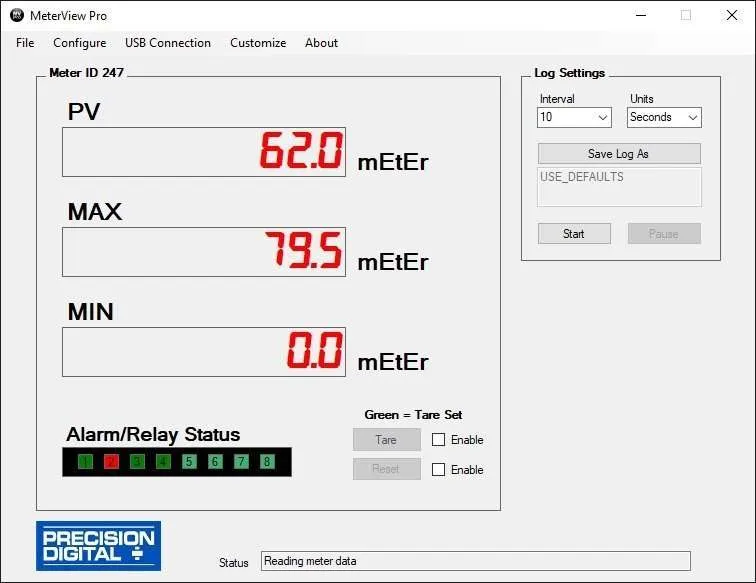
Setup
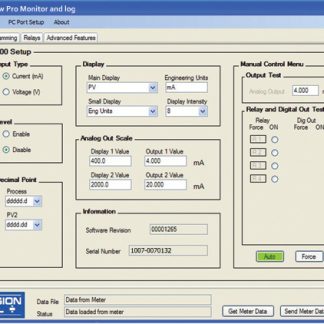
Programming
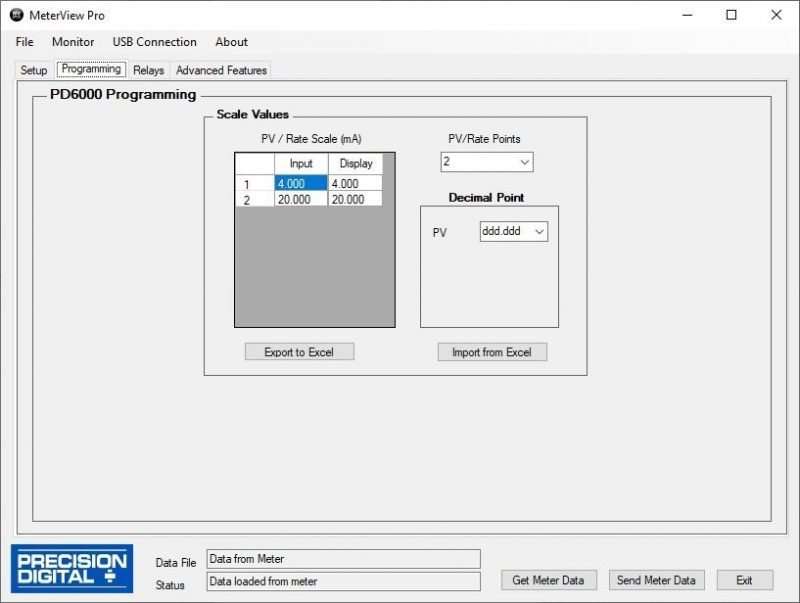
Relays
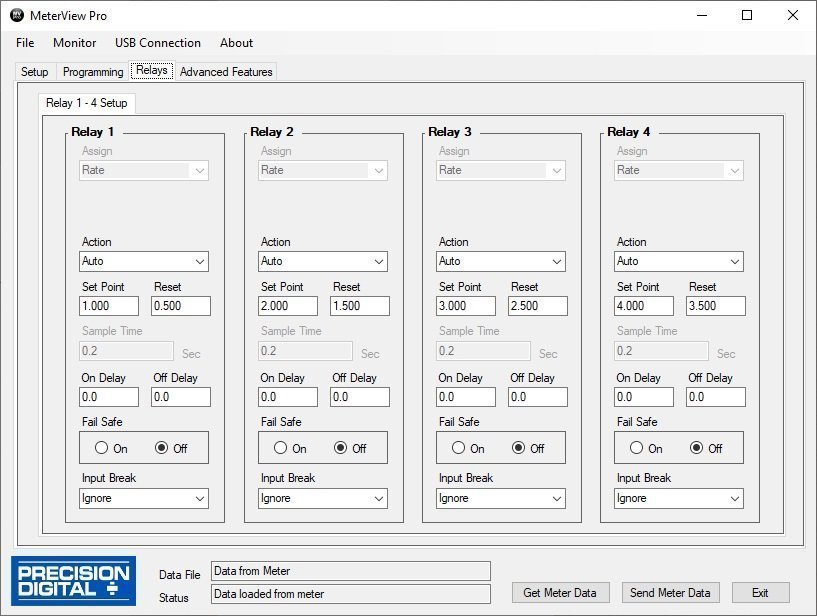
Data Sheet: LDS2-6210 Data Sheet
Instruction Manual:LIM2-6210_0 Instrument

